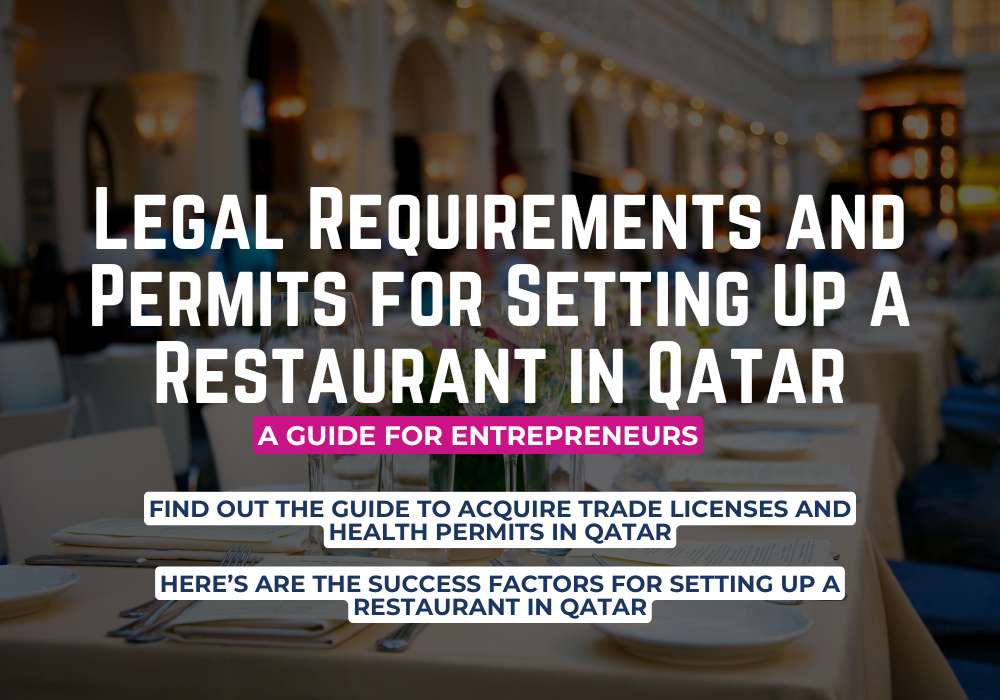Setting up a restaurant in Qatar can be an exciting and rewarding venture given the country’s thriving hospitality industry and diverse culinary landscape. This comprehensive guide will walk you through the key steps involved, from understanding the essential legalities and obtaining necessary permits to identifying critical success factors that can help your restaurant flourish in the competitive Qatari market.
Navigating the legal requirements and permits for establishing a restaurant in Qatar is crucial. We’ll provide a step-by-step guide to acquiring the necessary trade licenses and health permits to ensure your business complies with local regulations. Understanding these legalities not only helps in avoiding potential legal issues but also ensures smooth operations right from the start.
Next, we’ll delve into the critical success factors for setting up a restaurant in Qatar. Selecting the ideal location, understanding local demographics, and crafting effective marketing and business strategies are all vital for attracting and retaining customers in the region. We’ll explore how to leverage these factors to gain a competitive edge and build a loyal customer base.
By understanding the intricacies involved in setting up a restaurant in Qatar, you can make informed decisions that positively impact your venture. From complying with legal requirements to engaging effectively with the local market, this guide aims to equip you with the knowledge needed to succeed in Qatar’s dynamic restaurant industry.
Legal Requirements and Permits for Setting Up a Restaurant in Qatar
Understanding the Essential Legalities and Necessary Permits
When setting up a restaurant in Qatar, it’s crucial to understand the legal landscape and acquire the necessary permits. Compliance with Qatari laws ensures that your restaurant operates smoothly and avoids any legal troubles. Here are the key legalities you need to be aware of:
- Business Structure: Decide on the legal structure of your restaurant. Common structures include Sole Proprietorship, Partnership, or Limited Liability Company (LLC). Each has different regulatory requirements and implications.
- Commercial Registration (CR): All businesses in Qatar must be registered with the Ministry of Commerce and Industry (MOCI). This registration is mandatory before you can operate legally.
- Municipal License: Issued by the local municipality, this license is necessary to use the premises for commercial purposes.
- Signage Permit: Obtain approval for any exterior signs or advertisements for your restaurant.
- Civil Defense Approval: Ensure your restaurant meets fire safety and emergency protocols as outlined by the Civil Defense Department.
- Environmental Permit: Depending on your location, you may need to secure an environmental permit to ensure your operations do not adversely impact the environment.
Step-by-Step Guide to Acquiring Trade Licenses and Health Permits in Qatar
Acquiring the necessary trade licenses and health permits is a structured process. Below are the clear steps to guide you through:
- Prepare Required Documents:
Gather essential documents such as the passport copies of the owners, Commercial Registration (CR), Articles of Association (AoA), and lease agreement for your restaurant premises
- Apply for Commercial Registration (CR):
Submit your application to the Ministry of Commerce and Industry (MOCI). Include all required documents and pay the necessary fees. This process typically takes a few weeks.
- Secure your Municipal License:
Once you have the CR, apply for a municipal license from your local municipality. The municipality will inspect your premises to ensure it meets local regulations.
- Obtain Approval from the Civil Defense Department:
Submit your restaurant layout and safety plans to the Civil Defense Department. They will inspect and certify that your establishment meets fire safety and emergency standards.
- Apply for a Health Permit:
At this stage, apply to the Ministry of Public Health (MoPH) for a health permit. Health inspectors will visit your restaurant to ensure compliance with health and hygiene standards.
- Signage Permit:
If you plan to have exterior signage, apply to the municipality for a signage permit. Provide detailed designs and locations of the signs.
- Environmental Permit (if applicable):
If your restaurant’s location requires it, apply for an environmental permit from the Ministry of Municipality and Environment. This ensures that your establishment does not negatively impact the surrounding environment.
Key Advantages of Understanding and Complying with Legal Requirements
Understanding and adhering to the legal requirements for setting up a restaurant in Qatar offers several benefits:
- Operational Legitimacy: Ensures your restaurant operates legally and can attract customers who value legal and compliant establishments.
- Avoiding Penalties: Compliance helps you avoid fines, closures, or other penalties associated with regulatory breaches.
- Safety and Hygiene Standards: Following health and safety regulations guarantees a safe environment for your customers and staff, enhancing your restaurant’s reputation.
- Smooth Business Operations: Completing all necessary permits and licenses facilitates a smoother launch and ongoing operations, minimizing interruptions and delays.
The Significance of Legal Compliance
Legal compliance is not just a box-ticking exercise; it has significant implications for your restaurant’s success:
- Building Trust: Customers are more likely to trust and patronize a restaurant that is fully licensed and compliant with local laws.
- Insurance Requirements: Fully licensed establishments can meet insurance requirements more easily, helping you protect your investment.
- Attractive to Investors: Compliance makes your business more attractive to potential investors or partners looking for legitimate and reliable ventures.
- Market Credibility: Being legally compliant enhances your business’s credibility, which is crucial for building a strong market presence in Qatar’s competitive restaurant industry.
Positive Impact on Your Restaurant
Complying with Qatar’s legal requirements can positively impact your restaurant in several ways:
- Customer Confidence: A compliant restaurant reassures customers about the quality and safety of the food and services you offer.
- Employee Well-being: Ensuring a safe and regulated work environment boosts employee morale and retention, leading to better service for your customers.
- Business Growth: Legal compliance fosters a stable foundation for your business, allowing for smoother expansions and scaling of operations without legal hindrances.
- Community Relations: Being a compliant and responsible business can enhance your relationship with the local community, leading to more support and patronage.
Overall, understanding and meeting the legal requirements for setting up a restaurant in Qatar is crucial for sustainable and successful operation. It not only helps avoid legal issues but also builds a framework for long-term growth and customer satisfaction.
Setup Your Restaurant in Qatar! We Will Assist You From A-Z.

Critical Success Factors for Setting Up a Restaurant in Qatar
Selecting the Ideal Location and Understanding Local Demographics
Setting up a restaurant in Qatar successfully hinges on choosing the right location and understanding the local demographics. The location is a major determinant of foot traffic, accessibility, and ultimately, the restaurant’s profitability.
How to Select the Ideal Location
Here are the steps to help you find the perfect spot:
- Research Popular Areas: High foot-traffic areas like shopping malls, business districts, and tourist attractions tend to attract more customers.
- Consider Accessibility: Ensure the location is easily accessible by public transport and has ample parking space.
- Evaluate Competition: Study the existing restaurants in the area. A location with fewer direct competitors might be more advantageous.
- Check Zoning Laws: Make sure the area is zoned for commercial use and that there are no restrictions on setting up a restaurant.
- Assess Target Market: Identify the local demographics and their dining preferences. For example, family-friendly areas might prefer cafes and casual dining, while business districts might need more fine dining options.
For instance, setting up in Doha’s West Bay area could attract a steady flow of business professionals and tourists, whereas a location in a residential neighborhood like Al Waab might be more suitable for family-oriented dining.
Understanding Local Demographics
Understanding the demographics of your target market is essential:
- Age and Income: Younger crowds might prefer trendy fast-food options, while higher-income groups might seek gourmet dining experiences.
- Expat versus Local Population: Knowing the ratio of expats to locals can help tailor your menu and dining experience to meet their preferences.
- Cultural Sensitivities: Be aware of dietary restrictions and cultural practices, such as halal food requirements and the observance of Ramadan.
In Qatar, a large percentage of the population consists of expatriates from various cultures, leading to a diverse culinary landscape. For instance, targeting areas with a high concentration of Indian expatriates may benefit from offering spicy and traditional Indian cuisine.
Effective Marketing and Business Strategies Tailored for the Qatari Market
Once you have secured the ideal location and understood your target demographics, the next step is to implement effective marketing and business strategies that cater specifically to the Qatari market.
Creating a Strong Brand Identity
Your restaurant’s brand identity sets you apart from competitors. Here’s how to create a compelling brand:
- Define Your Unique Selling Proposition: Identify what makes your restaurant unique. It could be your cuisine, exceptional service, or a unique dining experience.
- Develop a Memorable Logo and Design: Choose colors, fonts, and designs that reflect your brand’s personality and appeal to your target audience.
- Create an Engaging Online Presence: Develop a user-friendly website and maintain active social media profiles. Share high-quality images of your dishes and updates about your restaurant to attract customers online.
For example, a seafood restaurant could highlight its commitment to sourcing fresh, sustainable fish and offer a modern, nautical-themed dining experience.
Implementing Effective Marketing Strategies
A robust marketing plan can significantly impact your restaurant’s success. Here are some strategies to consider:
- Leverage Social Media: Use platforms like Instagram and Facebook to engage with potential customers. Share photos, promotions, and customer testimonials to build a loyal following.
- Collaborate with Influencers: Partner with local food bloggers and influencers to reach a broader audience and gain credibility in the market.
- Offer Promotions and Discounts: Attract new customers by offering limited-time discounts, loyalty programs, and special promotions during holidays and events.
- Engage in Community Events: Participate in local events and sponsor community activities to increase your restaurant’s visibility and reputation.
For instance, a new café in Doha could collaborate with local influencers to host a grand opening event, offering free samples and promotional discounts to attract customers and generate buzz.
Optimizing Operations for Customer Satisfaction
Delivering an exceptional dining experience is key to retaining customers and ensuring positive word-of-mouth. Consider these operational strategies:
- Train Staff Regularly: Provide comprehensive training to ensure staff are knowledgeable, friendly, and efficient. This directly impacts customer satisfaction.
- Maintain High Standards of Cleanliness: Regularly inspect and uphold cleanliness standards in the dining area, kitchen, and restrooms.
- Offer a Varied and High-Quality Menu: Ensure your menu offers a range of options to cater to different tastes and dietary requirements.
- Provide Consistent Service: Ensure a consistently high level of service to build trust and a loyal customer base.
For example, a fine dining restaurant in Qatar might offer gourmet dishes crafted by experienced chefs, along with personalized service to make every dining experience special.
Monitoring and Adapting to Market Trends
The culinary market is ever-evolving, and staying ahead of trends can give you a competitive edge. Here’s how to keep your restaurant relevant:
- Stay Informed: Regularly research market trends, customer preferences, and emerging food technologies.
- Collect Feedback: Use customer feedback to identify areas for improvement and adapt your offerings accordingly.
- Innovate Continuously: Experiment with new dishes, dining concepts, and service innovations to keep your restaurant exciting and inviting.
For instance, incorporating digital ordering systems or offering plant-based menu options can cater to modern customer preferences and streamline operations.
The Significance of Understanding Critical Success Factors
Understanding and implementing critical success factors when setting up a restaurant in Qatar is paramount. By selecting the ideal location, tailoring your marketing strategies, optimizing restaurant operations, and staying ahead of market trends, you can build a thriving restaurant that appeals to Qatar’s diverse and dynamic population. These strategies not only enhance customer satisfaction but also ensure long-term profitability and success in a competitive market.
Setting up a restaurant in Qatar involves navigating a complex but rewarding process. Understanding the essential legalities and obtaining the necessary permits are the foundational steps. Acquiring trade licenses and health permits requires careful attention to detail, following a step-by-step process to ensure compliance with local regulations. With these legal requirements in place, you can focus on the critical success factors that will make your restaurant thrive in the Qatari market.
Choosing the ideal location is crucial, as it directly impacts your ability to attract and retain customers. Conduct thorough research to understand the local demographics and select a site that aligns with your target audience. Additionally, effective marketing tailored to the unique aspects of the Qatari culture and consumer behavior is vital. Crafting thoughtful business strategies that resonate with locals can distinguish your restaurant in a competitive landscape.
Setting up a restaurant in Qatar can positively impact both your personal and professional life. Economically, a thriving restaurant can be a lucrative venture, providing financial stability and opportunities for growth. On a larger scale, successfully navigating the establishment of your restaurant will contribute to Qatar’s diverse culinary scene, offering new dining experiences to locals and tourists alike. Understanding and valuing the unique aspects of the Qatari market will ultimately help you build a successful restaurant that can stand the test of time.
Setup Your Restaurant in Qatar! We Will Assist You From A-Z.






